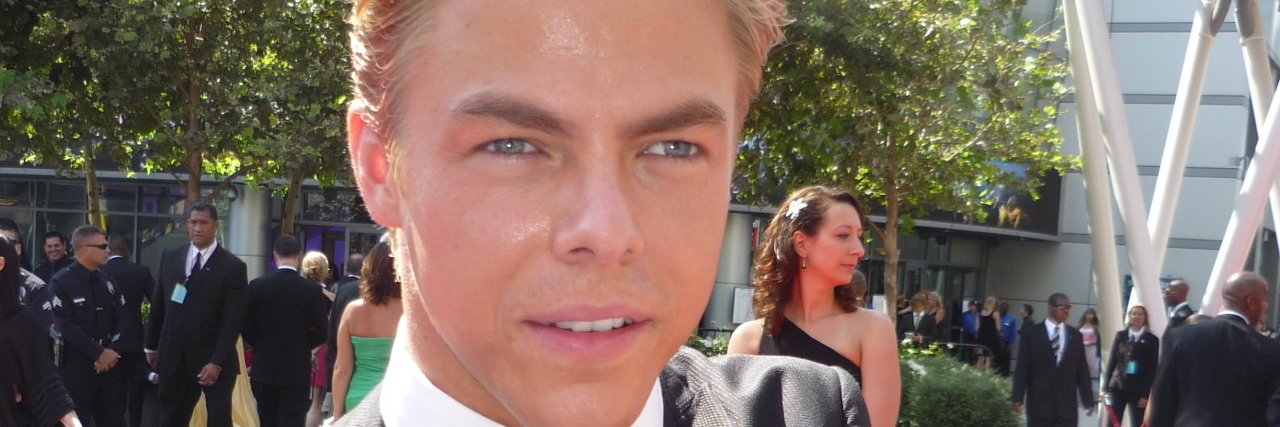Sometimes the news isn’t as straightforward as it’s made to seem. Elizabeth Cassidy, The Mighty’s News Intern, explains what to keep in mind if you see this topic or similar stories in your newsfeed. This is The Mighty Takeaway.
Editor’s note: If you experience suicidal thoughts, the following post could be potentially triggering. You can contact the Crisis Text Line by texting “START” to 741-741.
Derek Hough recently released his debut single “Hold On,” a powerful tribute to suicide awareness, especially as it relates to men. But as someone who has survived a suicide attempt and is an active advocate for mental health awareness, I can’t overlook how problematic the music video is.
The video, which was directed by Hough, centers on two people, one of which is played by Hough. His character appears to be a war veteran who has post-traumatic stress disorder (PTSD). The other character, played by Kayla Elwell from “Vampire Diaries,” seems to be a mother grieving the loss of her young daughter. Both characters become suicidal over the course of the video. To portray this, three possible ways to die by suicide are shown.
This is where I have a problem. Showing the means of a suicide is not beneficial and can actually be harmful to people who are feeling suicidal. It’s called suicide contagion, and it’s a real phenomenon that can happen when the media covers suicide irresponsibly. According to the U.S. Department of Health and Human Services, “reports should not divulge detailed descriptions of the method used to avoid possible duplication.”
While the music video doesn’t show a completed suicide, it shows rehearsals. Rehearsals are repetitive behaviors that are related to a plan, and something some people with suicidal behavior do —myself included. Watching the music video, the rehearsals were enough to trigger me. Not that the music video made me suicidal, but it brought me back to how it felt to be suicidal and caused negative thoughts that have quieted down in the last couple months.
Before anyone says, “Don’t watch it, then,” you should know, there were no content warnings before the video. Yes, I happened to know it would be about mental health and suicide, but someone else might not, and just because I knew what the video was about, doesn’t mean I expected to see triggering content. The video also lacked any resources for those who might be struggling. At the very least, the official video on YouTube should open with a content warning letting people know the video shows suicidal behavior.
I can’t imagine how Hough’s video would have made me feel if had I watched it during a less stable time. I can tell you it would have at least caused some rehearsal on my part. Watching something like this music video would not have made me feel hopeful, which, if you listen to the lyrics, is what the song conveys. All I could focus on was the means of suicide shown in the video, and I’m sure I’m not the only one who would have fixated on this.
I applaud Hough for using his talents and platform to raise awareness about suicide and mental health. Hough also partnered with Movember, an organization that strives to increase awareness around men’s health issues including mental health and suicide, for the song.
Hough told Billboard he originally recorded the song five years ago for a friend who was struggling, but, after learning about Chester Bennington’s death, wanted to redo the song. Suicide is personal for Hough, who not only knew Bennington, had an uncle who died by suicide.
It’s great we are talking about suicide more, but Hough and others who use their talents to raise suicide awareness need to do so responsibly. A music video showing ways to die does not equal good suicide awareness. There are other ways to portray mental health issues such as showing a person taking their medications responsibly, going to therapy or in the hospital trying to get better. Hough could easily tell people to “hold on” without showing them ways to die.
I’m glad another celebrity is using their platform for an important conversation, but we need to discuss suicide in a nonharmful way. People’s lives depend on it.
If you or someone you know needs help, visit our suicide prevention resources page.
If you need support right now, call the National Suicide Prevention Lifeline at 1-800-273-8255, the Trevor Project at 1-866-488-7386 or text “HOME” to 741-741. Head here for a list of crisis centers around the world.
Image via Wikimedia Commons/Greg Hernandez

